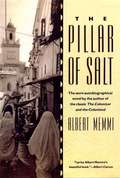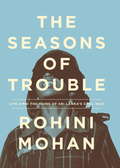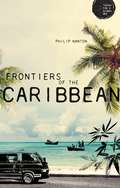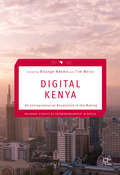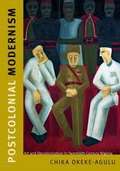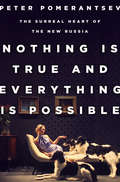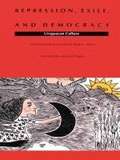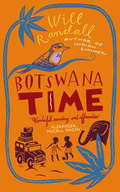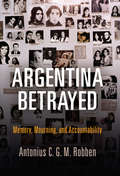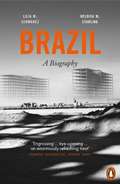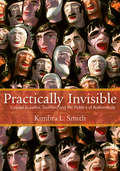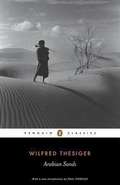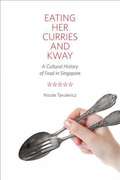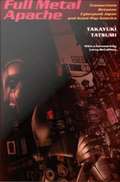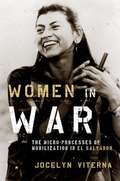Special Collections
World Book Day 2020: Marrakesh Treaty
- Table View
- List View
The Pillar of Salt
by Albert Memmi and Edouard RoditiOriginally published in 1955, The Pillar of Salt the semi-autobiographical novel about a young boy growing up in French colonized Tunisia. To gain access to privileged French society, he must reject his many identities – Jew, Arab, and African. But, on the eve of World War II, he is forced to come to terms with his loyalties and his past.
The Seasons of Trouble
by Rohini MohanFor three decades, Sri Lanka's civil war tore communities apart. In 2009, the Sri Lankan army finally defeated the separatist Tamil Tigers guerrillas in a fierce battle that swept up about 300,000 civilians and killed more than 40,000. More than a million had been displaced by the conflict, and the resilient among them still dared to hope. But the next five years changed everything.
Rohini Mohan's searing account of three lives caught up in the devastation looks beyond the heroism of wartime survival to reveal the creeping violence of the everyday. When city-bred Sarva is dragged off the streets by state forces, his middle-aged mother, Indra, searches for him through the labyrinthine Sri Lankan bureaucracy. Meanwhile, Mugil, a former child soldier, deserts the Tigers in the thick of war to protect her family.
Having survived, they struggle to live as the Sri Lankan state continues to attack minority Tamils and Muslims, frittering away the era of peace. Sarva flees the country, losing his way - and almost his life - in a bid for asylum. Mugil stays, breaking out of the refugee camp to rebuild her family and an ordinary life in the village she left as a girl. But in her tumultuous world, desires, plans, and people can be snatched away in a moment.
The Seasons of Trouble is a startling, brutal, yet beautifully written debut from a prize-winning journalist. It is a classic piece of reportage, five years in the making, and a trenchant, compassionate examination of the corrosive effect of conflict on a people.
Frontiers of the Caribbean
by Philip NantonThis book argues that the Caribbean frontier, usually assumed to have been eclipsed after colonial conquest, remains a powerful but unrecognised element of Caribbean island culture. Combining analytical and creative genres of writing, it explores historical and contemporary patterns of frontier change through a case study of the little-known Eastern Caribbean multi-island state of St Vincent and the Grenadines. Modern frontier traits are located in the wandering woodcutter, the squatter on government land and the mountainside ganja grower. But the frontier is also identified as part of global production that has shaped island tourism, the financial sector and patterns of migration.An electronic edition of this book is freely available under a Creative Commons (CC BY-NC-ND) licence.
Digital Kenya
by Bitange Ndemo and Tim WeissPresenting rigorous and original research, this volume offers key insights into the historical, cultural, social, economic and political forces at play in the creation of world-class ICT innovations in Kenya. Following the arrival of fiber-optic cables in 2009, Digital Kenya examines why the initial entrepreneurial spirit and digital revolution has begun to falter despite support from motivated entrepreneurs, international investors, policy experts and others.
Written by engaged scholars and professionals in the field, the book offers 15 eye-opening chapters and 14 one-on-one conversations with entrepreneurs and investors to ask why establishing ICT start-ups on a continental and global scale remains a challenge on the "Silicon Savannah". The authors present evidence-based recommendations to help Kenya to continue producing globally impactful ICT innovations that improve the lives of those still waiting on the side-lines, and to inspire other nations to do the same. This book is open access under a CC BY license.
Postcolonial Modernism
by Chika Okeke-AguluWritten by one of the foremost scholars of African art and featuring 129 color images, Postcolonial Modernism chronicles the emergence of artistic modernism in Nigeria in the heady years surrounding political independence in 1960, before the outbreak of civil war in 1967. Chika Okeke-Agulu traces the artistic, intellectual, and critical networks in several Nigerian cities. Zaria is particularly important, because it was there, at the Nigerian College of Arts, Science and Technology, that a group of students formed the Art Society and inaugurated postcolonial modernism in Nigeria.
As Okeke-Agulu explains, their works show both a deep connection with local artistic traditions and the stylistic sophistication that we have come to associate with twentieth-century modernist practices. He explores how these young Nigerian artists were inspired by the rhetoric and ideologies of decolonization and nationalism in the early- and mid-twentieth century and, later, by advocates of negritude and pan-Africanism. They translated the experiences of decolonization into a distinctive "postcolonial modernism" that has continued to inform the work of major Nigerian artists.
Nothing Is True and Everything Is Possible
by Peter PomerantsevIn the new Russia, even dictatorship is a reality show.
Professional killers with the souls of artists, would-be theater directors turned Kremlin puppet-masters, suicidal supermodels, Hell’s Angels who hallucinate themselves as holy warriors, and oligarch revolutionaries: welcome to the glittering, surreal heart of twenty-first-century Russia. It is a world erupting with new money and new power, changing so fast it breaks all sense of reality, home to a form of dictatorship-far subtler than twentieth-century strains-that is rapidly rising to challenge the West.
When British producer Peter Pomerantsev plunges into the booming Russian TV industry, he gains access to every nook and corrupt cranny of the country. He is brought to smoky rooms for meetings with propaganda gurus running the nerve-center of the Russian media machine, and visits Siberian mafia-towns and the salons of the international super-rich in London and the US.
As the Putin regime becomes more aggressive, Pomerantsev finds himself drawn further into the system. Dazzling yet piercingly insightful, Nothing Is True and Everything Is Possible is an unforgettable voyage into a country spinning from decadence into madness.
Repression, Exile, and Democracy
by Louise B. Popkin and Saul SosnowskiRepression, Exile, and Democracy, translated from the Spanish, is the first work to examine the impact of dictatorship on Uruguyan culture.
Some of Uruguay's best-known poets, writers of fiction, playwrights, literary critics and social scientists participate in this multidisciplinary study, analyzing how varying cultural expressions have been affected by conditions of censorship, exile and "insilio" (internal exile), torture, and death.
The first section provides a context for the volume, with its analyses of the historical, political, and social aspects of the Uruguayan experience. The following chapters explore various aspects of cultural production, including personal experiences of exile and imprisonment, popular music, censorship, literary criticism, return from exile, and the role that culture plays in redemocratization.
This book's appeal extends well beyond the study of Uruguay to scholars and students of the history and culture of other Latin American nations, as well as to fields of comparative literature and politics in general.
Contributors. Hugo Achugar, Alvarro Barros-Lémez, Lisa Block de Behar, Amanda Berenguer, Hiber Conteris, José Pedro Díaz, Eduardo Galeano, Edy Kaufman, Leo Masliah, Carina Perelli, Teresa Porzecanski, Juan Rial, Mauricio Rosencof, Jorge Ruffinelli, Saúl Sosonowski, Martin Weinstein, Ruben Yáñez
Botswana Time
by Will RandallWill Randall travels with a purpose, as well as an outrageous sense of fortune. In INDIAN SUMMER he found himself, by chance, having the extraordinary experience of helping slum schoolchildren put on a play to help save their school. In Botswana he was taken up by a headmaster to teach a class of six year olds at The River of Life school. They are football crazy and one of Will's jobs is to take them to play neighbouring (sometimes as much as 100 miles away) schools. Camping en-route or staying in farms and rural villages, often travelling by foot or dug-out punts, thousands of antelope, elephant, buffalo and zebra follow their progress. The sound of lions, leopards and hyenas become the soundtrack of their dreams. Against all the odds they find themselves preparing for the Grand Final of the season - the titanic clash with arch rivals, Victoria Falls Primary school.Both an endearing personal story and a travel book about a little-known but highly successful country, BOTSWANA TIME will win new fans for both Will Randall and the extraordinary country of Botswana.
Argentina Betrayed
by Antonius C. RobbenThe ruthless military dictatorship that ruled Argentina between 1976 and 1983 betrayed the country's people, presiding over massive disappearances of its citizenry and, in the process, destroying the state's trustworthiness as the guardian of safety and well-being. Desperate relatives risked their lives to find the disappeared, and one group of mothers defied the repressive regime with weekly protests at the Plaza de Mayo in Buenos Aires. How do societies cope with human losses and sociocultural traumas in the aftermath of such instances of political violence and state terror?
In Argentina Betrayed, Antonius C. G. M. Robben demonstrates that the dynamics of trust and betrayal that convulsed Argentina during the dictatorship did not end when democracy returned but rather persisted in confrontations over issues such as the truth about the disappearances, the commemoration of the past, and the guilt and accountability of perpetrators. Successive governments failed to resolve these debates because of erratic policies made under pressure from both military and human rights groups. Mutual mistrust between the state, retired officers, former insurgents, and bereaved relatives has been fueled by recurrent revelations and controversies that prevent Argentine society from conclusively coming to terms with its traumatic past.
With thirty years of scholarly engagement with Argentina—and drawing on his extensive, fair-minded interviews with principals at all points along the political spectrum—Robben explores how these ongoing dynamics have influenced the complicated mourning over violent deaths and disappearances. His analysis deploys key concepts from the contemporary literature of human rights, transitional justice, peace and reconciliation, and memory studies, including notions of trauma, denial, accountability, and mourning. The resulting volume is an indispensable contribution to a better understanding of the terrible crimes committed by the Argentine dictatorship in the 1970s and their aftermath.
Brazil
by Heloisa Maria Starling and Lilia Moritz SchwarczSince Europeans first reached Brazil in 1500 it has been an unfailing source of extraordinary fascination. More than any other part of the 'New World' it displayed both the greatest beauty and grandeur and witnessed scenes of the most terrible European ferocity.
Brazil: A Biography, written by two of Brazil's leading historians and a bestseller in Brazil itself, is a remarkable attempt to convey the overwhelming diversity and challenges of this huge country from its origins to the 21st century - larger than the contiguous USA and still in some regions not fully mapped. The book's major themes are the near-continuous battles to create both political institutions and social frameworks that would allow stable growth, legal norms and protection for all its citizens.
Brazil's failure to achieve these except in the very short term has been tragic, but even now it remains one of the world's great experiments - creative, harsh, unique and as compelling a story for its inhabitants as for outsiders.
Practically Invisible
by Kimbra SmithThe community of Agua Blanca, deep within the Machalilla National Park on the coast of Ecuador, found itself facing the twenty-first century with a choice: embrace a booming tourist industry eager to experience a preconceived notion of indigeneity, or risk losing a battle against the encroaching forces of capitalism and development. The facts spoke for themselves, however, as tourism dollars became the most significant source of income in the community.
Thus came a nearly inevitable shock, as the daily rhythms of life--rising before dawn to prepare for a long day of maintaining livestock and crops; returning for a late lunch and siesta; joining in a game of soccer followed by dinner in the evening--transformed forever in favor of a new tourist industry and the compromises required to support it. As Practically Invisible demonstrates, for Agua Blancans, becoming a supposedly "authentic" version of their own indigenous selves required performing their culture for outsiders, thus becoming these performances within the minds of these visitors.
At the heart of this story, then, is a delicate balancing act between tradition and survival, a performance experienced by countless indigenous groups.
Arabian Sands
by Rory Stewart and Wilfred ThesigerIn Arabian Sands, William Thesiger charts the time he spent living with the Bedu, including his legendary traverses of the Empty Quarter.
Eating Her Curries and Kway
by Nicole TaruleviczWhile eating is a universal experience, for Singaporeans it carries strong national connotations. The popular Singaporean-English phrase "Die die must try" is not so much hyperbole as it is a reflection of the lengths that Singaporeans will go to find great dishes.
In Eating Her Curries and Kway: A Cultural History of Food in Singapore, Nicole Tarulevicz argues that in a society that has undergone substantial change in a relatively short amount of time, food serves Singaporeans as a poignant connection to the past. Covering the period from British settlement in 1819 to the present and focusing on the post-1965 postcolonial era, Tarulevicz tells the story of Singapore through the production and consumption of food.
Analyzing a variety of sources that range from cookbooks to architectural and city plans, Tarulevicz offers a thematic history of this unusual country, which was colonized by the British and operated as a port within Malaya, but which is without a substantial pre-colonial history.
Connecting food culture to the larger history of Singapore, she discusses various topics including domesticity and home economics, housing and architecture, advertising, and the regulation of food-related manners and public behavior such as hawking, littering, and chewing gum.
Moving away from the predominantly political and economic focus of other histories of Singapore, Tarulevicz provides an important alternative reading of Singaporean society.
Full Metal Apache
by Takayuki TatsumiTakayuki Tatsumi is one of Japan's leading cultural critics, renowned for his work on American literature and culture. With his encyclopedic knowledge and fan's love of both Japanese and American art and literature, he is perhaps uniquely well situated to offer this study of the dynamic crosscurrents between the avant-gardes and pop cultures of Japan and the United States.
In Full Metal Apache, Tatsumi looks at the work of artists from both sides of the Pacific: fiction writers and poets, folklorists and filmmakers, anime artists, playwrights, musicians, manga creators, and performance artists. Tatsumi shows how, over the past twenty years or so, writers and artists have openly and exuberantly appropriated materials drawn from East and West, from sources both high and low, challenging and unraveling the stereotypical images Japan and America have of one another.
Full Metal Apache introduces English-language readers to a vast array of Japanese writers and performers and considers their work in relation to the output of William Gibson, Thomas Pynchon, H. G. Wells, Jack London, J. G. Ballard, and other Westerners. Tatsumi moves from the poetics of metafiction to the complex career of Madame Butterfly stories and from the role of the Anglo-American Lafcadio Hearn in promoting Japanese folklore within Japan during the nineteenth century to the Japanese monster Godzilla as an embodiment of both Japanese and Western ideas about the Other.
Along the way, Tatsumi develops original arguments about the self-fashioning of "Japanoids" in the globalist age, the philosophy of "creative masochism" inherent within postwar Japanese culture, and the psychology of "Mikadophilia" indispensable for the construction of a cyborg identity. Tatsumi's exploration of the interplay between Japanese and American cultural productions is as electric, ebullient, and provocative as the texts and performances he analyzes.
Women in War
by Jocelyn ViternaWaging war has historically been an almost exclusively male endeavor, yet over the past several decades women have joined insurgent armies in significant and surprising numbers. Why do women become guerrilla insurgents? What experiences do they have in guerrilla armies? And what are the long-term repercussions of this participation for the women themselves and the societies in which they live?
Women in War answers these questions while providing a rare look at guerrilla life from the viewpoint of rank-and-file participants. Using data from 230 in-depth interviews with men and women guerrillas, guerrilla supporters, and non-participants in rural El Salvador, Women in War investigates why some women were able to channel their wartime actions into post-war gains, and how those patterns differ from the benefits that accrued to men. By accounting for these variations, Women in War helps resolve current, polarized debates about the effects of war on women, and by extension, develops our nascent understanding of the effects of women combatants on warfare, political violence, and gender systems.
